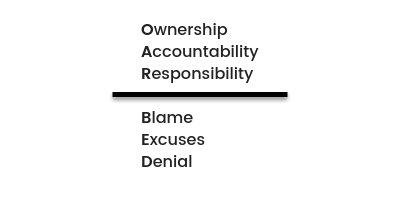A model for responsibility
What does responsibility have to do with foresight?
Models simplify concepts and make them easy to understand. There are a couple of really good models for responsibly. One such model is the OAR / BED model. The OAR / BED model divides behaviour into above and below the line. Above the line behaviours are proactive, conscious and associated with being a victor: Whilst below the line behaviours are reactive, unconscious and associated with being a victim. For the moment, let’s consider the OAR part of the model and how closely linked foresight is to being responsible. See the OAR / BED model below:

Responsibility as a context
I remember hearing a perspective that held, if “I” were to take on being 100% responsible for anything then my world would alter and therefore so does the world around me. It is contextual of course, not the literal truth and it begins by asking a question. “Who am I that …………………….. is the way it is? ( you fill in the blank)” For example, “who am I that the world’s oceans are becoming full of plastic?” It is now widely recognised that there is not a molecule of ocean water that does not contain plastic. Now, did I put all that plastic there? No, of course not. And, if I come from a context of “I am 100% responsible”, which is not the truth but a created context, then I can look at the situation from a different perspective. One that is both conscious, proactive and even solutions focused. Of course, that applies once a situation has gotten out of hand. Plastic, an extreme example, being one of those things that are relevant right now. But what about foresight and its relationship to responsibility?
The clue lies in the ‘above the line’ behaviours
Remember, the above the line behaviours are pro-active and conscious. This means there is a high level of self-awareness and perhaps even situational awareness. The fact that responsibility is a conscious act makes it possible to predict, (not catastrophize) what is likely to occur given a particular set of circumstances. Further, we are all forced to live the reality we create for others. If I actively and consciously engage in a set of behaviours that are detrimental, then make no mistake, there will be consequences. Those consequences will be reaped and are directly attributable to those actions. The question is how willing are you to BE responsible for the impact of those behaviours? Responsibility is a willingness to BE answerable to or for something. No-one can make you BE responsible. You take that on yourself.
Seeing the impact down the line
The willingness to project those effects out into the future and the willingness to be responsible for the causal nature is what makes for a highly responsible person. Continuing the example of the state of our oceans and the role plastic plays in that; if you are operating from below the line it is easy to slip into victim and reactive behaviours. Excuses like the following are all too easy. “What can I do about it?” “I am only one person so what I do makes little difference.” Below the line behaviour perpetuates the status quo. It provides ready-made excuses for inaction and also serves as a way to collect evidence for that point-of-view and creates ideal conditions for you to continue to live in denial. Again, think oceans and plastic. Where do you sit in this? 100% responsible or not?
Examples closer to home
Of course, the issue of plastic and your personal role in it is extreme and it illustrates the point beautifully. I could have just as easily talked about climate change; it fits after all. I want to draw your attention closer to home or to work. How does this play out for you in those areas? If you were to take on 100% responsibility, being conscious of the impact of what you do, what you say and how you say it, how does that alter your relationships? This is where foresight comes into its own. It applies just as much to any positive scenarios as it does to the negative ones. It is not hard to see that over time the future alters. Being fully conscious, proactive and solutions-focused and better yet having the foresight to avoid pitfalls really is a game-changer.

